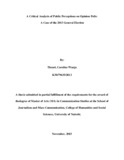| dc.description.abstract | The purpose of this study was to critically analyse public perception on Kenyan opinion polls, with a focus on the 2013 general election. The aim of this study was to recommend how to improve the future practice of political opinion polling in Kenya by evaluating public attitudes. The study therefore had four specific objectives. That is, to establish levels of public confidence on the authenticity of Kenyan polls, to test what pollsters are regarded as more or less credible by the public, to determine what factors influence the public perception of Kenyan opinion polls and to gather public suggestions on how to improve opinion polling in the country. When these four objectives were turned into questions, they comprised the queries that would guide the study. This study used a descriptive research design. The target population comprised 14, 339, 337 million of the actual voters who participated in the 2013 general election. These comprised the Kenyan voting public aged 18 years and above. The final sample of 1, 500 Kenyans comprised voters who were selected through a purposive non-probability sampling, at a margin error of + three per cent, at a 95 percent confidence level. The study achieved a response rate of 67.4 percent or 1,011 Kenyan voters. Data was generated through primary and secondary research. It was analyzed using Microsoft Excel and Statistical Package for the Social Scientists (SPSS) software, using frequency and cross-tabulation distributions. It was then presented using tables and bar chartsand analyzed with frequencies and percentages to show the relationship between the variables.
The study revealed that majority of the Kenyan voting public are not confident about public opinion polls. Hence, they perceive them as not credible due to a variety of reasons. For instance, owing to the negative effect of their results, lack of knowledge of what they entail, and viewing them as manipulation tools used by politicians and media. The study also revealed that opinion polls only determine voting behavior if cited by media and the politicians. The Kenyan public, however, are optimistic about opinion polls as they made recommendations about how they can be improved. For instance, pollsters can embark on an awareness campaign to educate the public about polls in terms of methodology and their importance as a voice of the common person. Furthermore, the public felt that since the media influences mass agenda during elections, pollsters can train them on how to report in terms of: data collection methods, sampling error, type of sample used, respondent selection, question wording and weighting | en_US |

